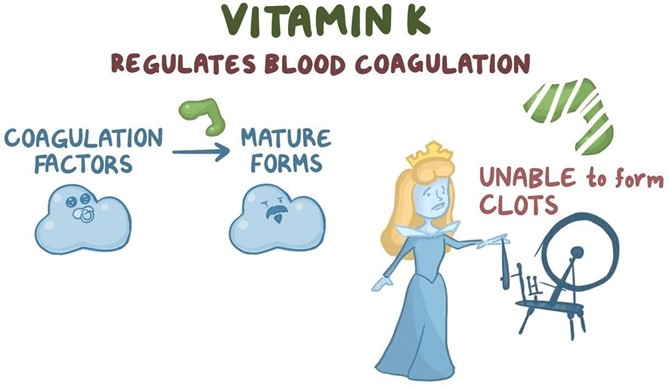A postpartum client has a fourth-degree perineal laceration. The nurse would expect which of the following medications to be ordered?
Select one:
Docusate sodium (Colace).
Bromocriptine (Parlodel).
Ferrous sulfate (Feosol).
Methylergonovine (Methergine).
The Correct Answer is A
Choice A Reason: Docusate sodium (Colace). This is because docusate sodium is a stool softener that can prevent constipation and straining during defecation, which can aggravate or impair the healing of a perineal laceration. A fourth-degree perineal laceration is a severe tear that extends through the skin, muscles, perineal body, and anal sphincter into the rectal mucosa. It can occur during vaginal delivery due to factors such as fetal macrosomia, forceps use, or episiotomy.
Choice B Reason: Bromocriptine (Parlodel). This is an inappropriate medication for a postpartum client with a fourth- degree perineal laceration, as it has no effect on wound healing or pain relief. Bromocriptine is a dopamine agonist that can suppress lactation by inhibiting prolactin secretion. It is used for women who do not wish to breastfeed or who have medical contraindications to breastfeeding.
Choice C Reason: Ferrous sulfate (Feosol). This is an unnecessary medication for a postpartum client with a fourth- degree perineal laceration, unless she has iron deficiency anemia. Ferrous sulfate is an iron supplement that can treat or prevent anemia by increasing hemoglobin production and oxygen-carrying capacity. Anemia can occur in the postpartum period due to blood loss during delivery or poor nutritional intake during pregnancy.
Choice D Reason: Methylergonovine (Methergine). This is an irrelevant medication for a postpartum client with a fourth-degree perineal laceration, as it does not affect wound healing or pain relief. Methylergonovine is an ergot alkaloid that can stimulate uterine contractions and reduce postpartum bleeding. It is used for women who have uterine atony or hemorrhage.
Nursing Test Bank
Naxlex Comprehensive Predictor Exams
Related Questions
Correct Answer is D
Explanation
Choice A Reason: Vitamin K will increase erythropoiesis. This is an incorrect statement that confuses vitamin K with erythropoietin. Erythropoietin is a hormone that stimulates red blood cell production in the bone marrow. Vitamin K does not affect erythropoiesis.
Choice B Reason: Vitamin K will enhance bilirubin breakdown. This is an incorrect statement that confuses vitamin K with phototherapy. Phototherapy is a treatment that exposes the newborn's skin to light, which converts bilirubin into water-soluble forms that can be excreted by the liver and kidneys. Bilirubin is a yellow pigment that results from the breakdown of red blood cells. High levels of bilirubin can cause jaundice and brain damage in newborns. Vitamin K does not affect bilirubin metabolism.
Choice C Reason: Vitamin K will stop Rh sensitization. This is an incorrect statement that confuses vitamin K with Rh immune globulin. Rh immune globulin is an injection given to Rh-negative mothers who deliver Rh-positive babies, to prevent them from developing antibodies against Rh-positive blood cells in future pregnancies. Rh sensitization is a condition where the mother's immune system atacks the baby's blood cells, causing hemolytic disease of the newborn. Vitamin K does not affect Rh sensitization.
Choice D Reason: Vitamin K will promote blood clotting ability. This is a correct statement that explains the rationale for administering vitamin K as prophylaxis to newborns. Vitamin K is essential for the synthesis of clotting factors in the liver. Newborns have low levels of vitamin K at birth due to poor placental transfer and lack of intestinal bacteria that produce vitamin K. Therefore, they are at risk of bleeding disorders such as hemorrhagic disease of the newborn.

Correct Answer is D
Explanation
Choice A Reason: Taking the newborn to the nursery for the initial assessment. This is an ineffective intervention that disrupts parental atachment by separating the mother and the newborn. It also deprives the newborn of the benefits of skin to skin contact and breastfeeding.
Choice B Reason: Allowing the mother a chance to rest without the baby immediately after delivery. This is an unnecessary intervention that delays parental atachment by postponing the first contact between the mother and the newborn. It also ignores the mother's desire and readiness to hold and feed her baby.
Choice C Reason: Placing the newborn under a radiant warmer to do the initial assessment. This is an outdated intervention that hinders parental atachment by creating a physical barrier between the mother and the newborn. It also exposes the newborn to potential risks such as dehydration, hyperthermia, or eye damage.
Choice D Reason: Placing the newborn on the maternal abdomen and doing the initial assessment. This is because this intervention facilitates skin to skin contact, eye contact, and bonding between the mother and the newborn. It also enhances breastfeeding initiation, thermoregulation, and maternal-infant atachment.
Whether you are a student looking to ace your exams or a practicing nurse seeking to enhance your expertise , our nursing education contents will empower you with the confidence and competence to make a difference in the lives of patients and become a respected leader in the healthcare field.
Visit Naxlex, invest in your future and unlock endless possibilities with our unparalleled nursing education contents today
Report Wrong Answer on the Current Question
Do you disagree with the answer? If yes, what is your expected answer? Explain.
Kindly be descriptive with the issue you are facing.
